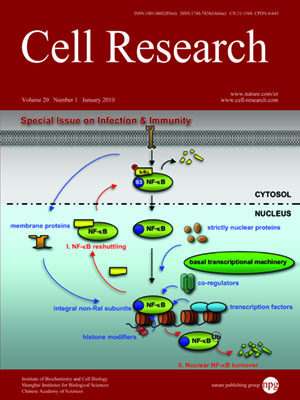
Volume 20, No 1, Jan 2010
ISSN: 1001-0602
EISSN: 1748-7838 2018
impact factor 17.848*
(Clarivate Analytics, 2019)
Volume 20 Issue 1, January 2010: 72-88
ORIGINAL ARTICLES
Fas stimulation of T lymphocytes promotes rapid intercellular exchange of death signals via membrane nanotubes
Peter D Arkwright1,2, Francesca Luchetti2,3, Julien Tour2, Charlotte Roberts2, Rahna Ayub2, Ana P Morales2, José J Rodríguez2, Andrew Gilmore2, Barbara Canonico3, Stefano Papa3 and Mauro Degli Esposti2
1University of Manchester, Royal Manchester Children's Hospital, Manchester
2Faculty of Life Sciences, University of Manchester, Oxford Road, Manchester, M13 9PT, United Kingdom
3Department of Human, Environmental and Nature Science, University of Urbino, Italy
Correspondence: Mauro Degli Esposti,(mauro.esposti@manchester.ac.uk )
The Fas/CD95 surface receptor mediates rapid death of various cell types, including autoreactive T cells with the potential for triggering autoimmunity. Here, we present novel aspects of Fas signalling that define a 'social' dimension to receptor-induced apoptosis. Fas stimulation rapidly induces extensive membrane nanotube formation between neighbouring T cells. This is critically dependent on Rho GTPases but not on caspase activation. Bidirectional transfer of membrane and cytosolic elements including active caspases can be observed to occur via these nanotubes. Nanotube formation and intercellular exchanges of death signals are defective in T lymphocytes from patients with autoimmune lymphoproliferative syndrome harbouring mutations in the Fas receptor. We conclude that nanotube-mediated exchanges constitute a novel form of intercellular communication that augments the propagation of death signalling between neighbouring T cells.
Cell Research (2010) 20:72-88. doi: 10.1038/cr.2009.112; published online 22 September 2009
FULL TEXT | PDF
Browse 2262


